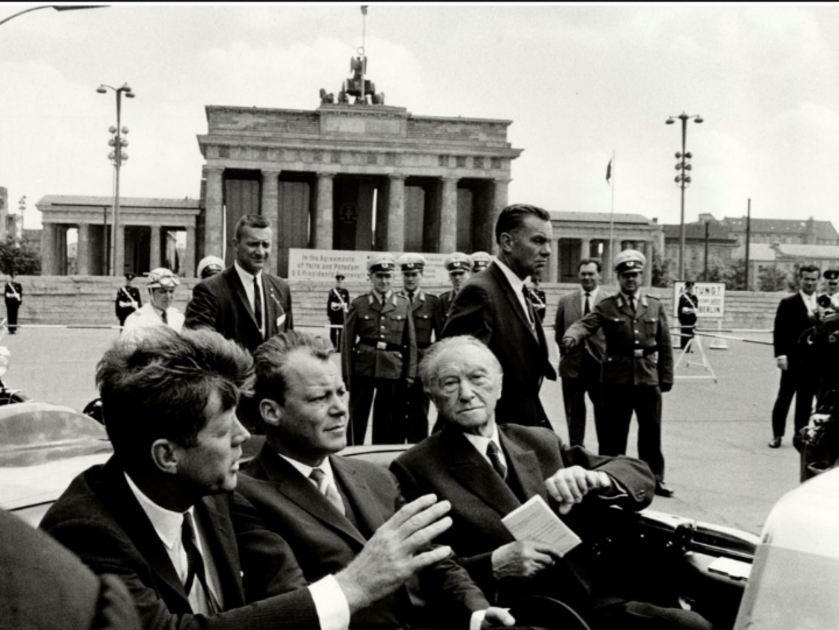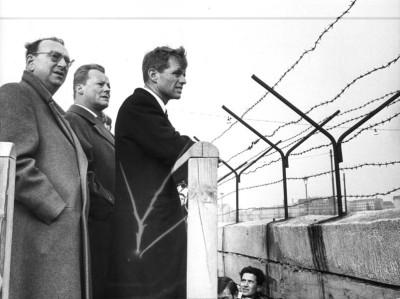

Would President John F. Kennedy have supported a southern border wall? Although comparisons between the Berlin Wall and Trump’s wall are like comparing apples to oranges, one was built to keep people from leaving and the other from entering illegally, there are some correlations between the two that give insight into what President Kennedy might have though about the current battle over border security in America.
Immigration was a major concern for Kennedy, in fact he wrote a book on the subject in 1958 titled A Nation Of Immigrants in which he explained his views on the issue. JFK sought the replacement of the “national origins” quota system with a formula comprised of three factors, priority #1 would be the skills of the immigrant and their relationship to America’s needs. Those admitted into the country would be vetted according to education and skills as not to displace low wage American workers or be a burden on the welfare system. Priority #2 would be the family relationship between the individual immigrant and persons already here, so that reuniting families is encouraged without bringing in entirely new family units or encouraging chain migration. Kennedy defined “persons already here” as United States citizens and lawfully resident aliens who entered the country legally and are adhering to our laws. The 3rd priority relates to people fleeing communism under the Refugee Relief Act of 1953 (67 Stat. 400) and basically stipulates that those wishing to emigrate would be required to, as Trump would say, “get in line” and follow an orderly process of registration. Immigration to the United States by communists was outlawed under the Immigration and Nationality Act of 1952. JFK co-sponsored the Communist Control Act of 1954 (68 Stat. 775) which outlawed the Communist Party and several other prominent conservative democrats of the time including those who would go on to become Presidential candidates in the 1960’s also supported the ban.

When it comes to the Berlin Wall, Kennedy indeed allowed its construction by the Soviets and his administration was privately relieved because he believed it represented the end of a crisis that had existed since the Berlin Airlift of 1948 – 1949 in which the communists had tried to starve the western half of the city with a blockade. Shortly after the first barbed wire rolled out and it became clear that a permanent wall was under construction JFK told his advisers “a wall is a hell of a lot better than a war. This is the end of the Berlin crisis. The other side panicked — not we. We’re going to do nothing now because there is no alternative except war. It’s all over, they’re not going to overrun Berlin.”

It was clear a refugee crisis had long existed in central Europe and from the time of the airlift to 1961 nearly 3 million East Germans had fled communism to the West through unsecured borders, averaging 19,000 a month and doubling in August shortly before construction began. So many skilled workers had fled that the socialist economy was on the brink of collapse. The population of West Berlin had grown to twice that of the eastern communist occupied half of the city.
“Khrushchev is losing East Germany. He cannot let that happen. If East Germany goes, so will Poland and all of Eastern Europe. He will have to do something to stop the flow of refugees. Perhaps a wall. And we won’t be able to prevent it. A wall is a hell of a lot better than a war.” -President John F. Kennedy
After the concertina wire was deployed and the concrete began to harden it was evident that no one could easily escape communism through West Berlin. Journalists covered the plight of those who continued to try to escape and were murdered by the Soviets and their satellite state and public outcry led Kennedy to protest the actions of the communists, but he made no attempt to stop construction of the wall.
